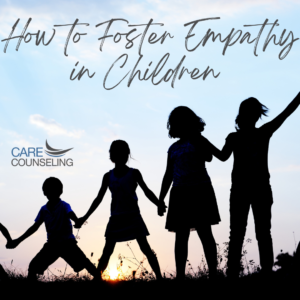How to Foster Empathy in Children
 Empathy, the ability to understand and share the feelings of others, is a crucial trait for building meaningful relationships and fostering emotional intelligence. Teaching children empathy is not only a way to help them become kinder and more compassionate individuals, but it also equips them with vital social and emotional skills that will serve them throughout their lives. In this article, we’ll explore effective strategies for fostering empathy in children.
Empathy, the ability to understand and share the feelings of others, is a crucial trait for building meaningful relationships and fostering emotional intelligence. Teaching children empathy is not only a way to help them become kinder and more compassionate individuals, but it also equips them with vital social and emotional skills that will serve them throughout their lives. In this article, we’ll explore effective strategies for fostering empathy in children.
- Be a Role Model
Children often learn by example. If they see their parents and caregivers demonstrating empathy and compassion in their interactions with others, they are more likely to internalize these qualities. Be mindful of how you treat others, especially in challenging situations. Children are keen observers, and they will emulate the behavior they see in the adults around them.
- Encourage Perspective-Taking
Empathy involves understanding another person’s perspective and feelings. Encourage children to consider how others might be feeling in various situations. You can do this by asking open-ended questions like, “How do you think your friend felt when that happened?” or “What would you do if you were in their shoes?” This helps children develop their ability to see situations from multiple viewpoints.
- Teach Active Listening
Active listening is a fundamental skill in building empathy. Teach your child to listen attentively when someone is talking, without interrupting or judgment. Ask them to repeat what they’ve heard to ensure they’ve understood correctly. This helps children not only comprehend others’ emotions but also feel heard and valued themselves.
- Read Empathy-Building Books
Reading age-appropriate books with themes related to empathy can be a powerful way to teach children about emotions and compassion. Look for books that explore the experiences and feelings of diverse characters and discuss these themes with your child. Some classic titles include “The Giving Tree” by Shel Silverstein and “The Hundred Dresses” by Eleanor Estes.
- Encourage Acts of Kindness
Fostering empathy involves turning understanding into action. Encourage your child to perform acts of kindness, both within your family and in their wider community. This could be as simple as helping a friend in need, participating in charity events, or volunteering together as a family.
- Discuss Feelings Openly
Create an environment where discussing feelings is encouraged and celebrated. When your child expresses their own emotions, whether positive or negative, acknowledge and validate their feelings. This not only helps children understand and manage their emotions but also increases their sensitivity to others’ feelings.
- Limit Exposure to Violence
Children are easily influenced by what they see in the media. Limit their exposure to violent or aggressive content, as it can desensitize them to the suffering of others. Instead, provide age-appropriate media that promotes empathy and understanding.
- Resolve Conflicts Positively
Teach children conflict resolution strategies that emphasize empathy and compromise. When conflicts arise, guide them in finding solutions that take into consideration the feelings and needs of all parties involved. This helps children learn that conflicts can be resolved peacefully and that empathetic communication is key.
- Support Their Interests and Hobbies
Encourage children to pursue hobbies and interests that allow them to connect with others and build empathy. Team sports, art, music, and volunteering can be excellent avenues for children to develop their social and emotional skills in a positive and supportive environment.
- Practice Mindfulness and Emotional Regulation
Help children develop mindfulness and emotional regulation skills. These practices can teach them to manage their own emotions and respond more empathetically to others. Simple mindfulness exercises, such as deep breathing and meditation, can be introduced to children from a young age.
- Discuss Diversity and Inclusion
Talk to your child about diversity, different cultures, and the importance of respecting and valuing everyone, regardless of their background. Encourage discussions about prejudice and discrimination, and promote the idea that empathy extends to all people.
- Be Patient and Persistent
Developing empathy is a gradual process, and it may take time for children to fully understand and embody this quality. Be patient and persistent in your efforts to foster empathy. Keep the lines of communication open and support their growth along the way.
Fostering empathy in children is a vital aspect of their development as compassionate, considerate individuals. By being a positive role model, teaching perspective-taking, promoting active listening, and encouraging acts of kindness, you can help your child build empathy and emotional intelligence. Remember that empathy is a lifelong skill that continues to evolve, so keep nurturing it in your child as they grow and interact with the world around them. By doing so, you’re helping to create a more empathetic and compassionate future generation.



























